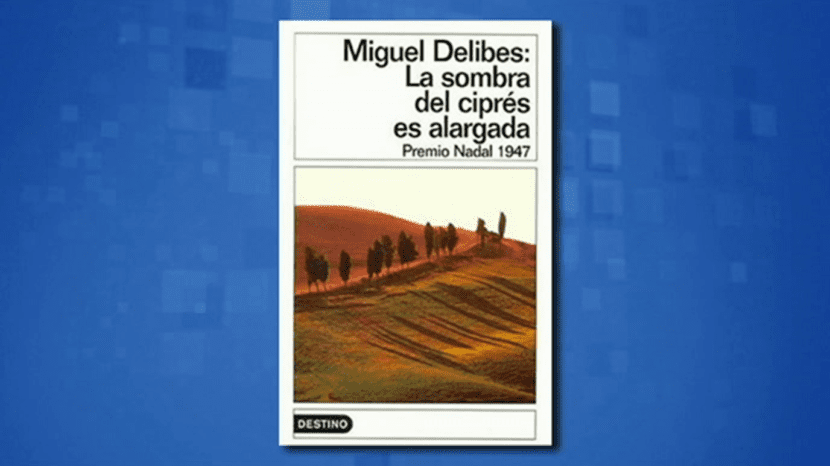
The shade of the cypress is elongated.
The shade of the cypress is elongated is a work written by Miguel Delibes Setién in 1948. It is classified as a learning novel where death exposes the perpetual vulnerability of the human being, turned into a victim of his own circumstance. In contrast, love plays a determining role in international relations.
The fear of pain is shown as a natural trigger for the existential pessimism that dominates the male protagonists of the narrative. Likewise, Christianity is a catalyst for the acceptance of emotional losses. Finally, feelings of loneliness and desolation are overcome thanks to good values such as willpower, morals, and education.
About the Author
Miguel Delibes Setién was a prominent Spanish intellectual born in Valladolid, on October 17, 1920. He became known as a traditional style novelist, although he also obtained a doctorate in law, was a professor in History of Commerce, journalist and head of the newspaper The North of Castile.
Its beginning in the letters
His lofty literary work began within the genre of the traditional novel with The shade of the cypress is elongated, for which, he received the Nadal Prize in 1948. During the following decade he continued his work with prominent publications such as Even it is day (1949) The road (1950) My idolized son Sisi (1953) and The red leaf (1959)
An extensive catalog
Miguel Delibes Setién extended his list of excellent books during successive decades with The rats (1962) Five hours with Mario (1966) The wars of our ancestors (1975) The holy innocents (1981) Lady in red on gray background (1991) Hunting (1992) and The heretic (1998) among others. Also, he is the author of very well crafted stories like The shroud (1970) The dethroned prince (1973) and The treasure (1985)
Miguel Delibes and cinema and theater
Some of the author's titles, such as The holy innocents, have been taken to the movies. Equally, Five hours with Mario y The wars of our ancestors they have been adapted to the theater. His writing demonstrates a very strong link with his place of origin, Valladolid, and with religion, offering his perspective of a liberal Catholic.
A critical view of society
As I progressó in his career, Delibes Setién evolvedó towards a critical approach to society with very marked references to the excesses and violence of life in cities. Many of his arguments revolve around the denunciation of social injustice, his ironic appreciation of the petty bourgeoisie, the remembrance of childhood and the representation of the habits and values of the rural environment.

Miguel Delibes.
The awards during his career and the end of his days
Miguel Delibes Setién is considered one of the most prominent authors of Spanish-language literature. Apart of the Nadal Prize, the most notorious decorations he obtained were the Critics' Prize in 1953, the Prince of Asturias Award in 1982, the National Prize for Spanish Letters in 1991 and the Miguel de Cervantes Prize in 1993.
The writer murged in his beloved hometown, Valladolid, on March 12, 2010. Today You can get the story of the author's life totally free on the web.
Conceptual analysis of the novel
The plot revolves around the sentimental, psychological and spiritual evolution of Pedro. Due to the painful losses that occurred during his childhood and youth, the main character proposes to part with all the elements that have significant value for him. Then, the so-called "disallocation theory" arises, a name given by the protagonist.
The transversality of this novel has all the characteristic elements of a learning novel. The philosophy of metaphysical thought breaks down through an introspective analysis of the character in a structure of thought very framed within Christian precepts.
This novel represented the consecration of Miguel Delibes Setién. The Valladolid writer demonstrated enormous versatility by being able to deal with different basic competences on citizenship, social problems, autonomy and personal initiative in a fluid way. The author also reflects his vision on morality, willpower and education as indispensable qualities to be able to improve oneself in life.
Summary
Pedro is a being traumatized and in permanent anguish due to the sentimental losses that he suffers with the passage of time. He is an orphan (he does not remember his parents), he has to grow up without the human warmth so necessary for the happiness of a child. This lack was accentuated by his tutors: first his uncle and then the education he received from Don Mateo, a teacher who instilled in him a pessimistic perception of existence.
Death is the inevitable fate that takes away everything that matters to Pedro: his loved ones, his friend Alfredo and his homeland, Ávila. War is described as the destructive shadow that looms over every quiet environment it touches. In this context of tremendous existential crisis, Pedro decides to become a sailor without love and without possessions.
The fear of suffering becomes unhealthy to the point that any small loss increases your desire for isolation and self-protection. Therefore, try to avoid as much as possible prolonged contact with other people, objects or places that could generate your affection. However, Pedro cannot help but fall in love with Jane, consequently, his posture falters and he feels vulnerable again.
At the climax moment Jane's passing brings back all the thoughts, feelings, and afflictions that I so conscientiously try to avoid since his childhood. But the beloved opened Peter's heart irreversibly. Consequently, the protagonist understands misalignment as a circumstantial phase in his life.

Quote by Miguel Delibes.
Finally, Pedro freed himselfó of all the weight of his past by accepting and appreciating each of the moments that he can remember, giving special value to the moments that he was able to share with his loved ones. The novel, itself, in a text to inspire.

Fragment
«In this period and during all these adventures I continued living as always, only to myself. The external vitality could not move me because I did not know it; I rejected all his possible temptations, and there came a time when I thought it was a simple thing to follow without hesitation the line that he had imposed on me beforehand. He supported an obtuse, blunt existence, without prominences ...
“… Of course I didn't miss them either. I had made myself live like this and any temporary variation would upset me, stirring in my soul the residue of my pessimism. In this way I almost achieved the point of stability that I was looking for so many years ago: to live autonomously, without cordial connections, without affection ... The only link that tied me to my past was the memory of Alfredo and the house of my teacher with the precious cargo of its inhabitants. "
La sombra… was a memorable reading for me: walking with Pedro through the night streets of Ávila was wonderful. Perhaps the pessimistic atmosphere is frowned upon by some critics or other readers, but I think I was an incredible resource that elevates the novel in a unique way, which I have seen little in other texts.
Fascinating!